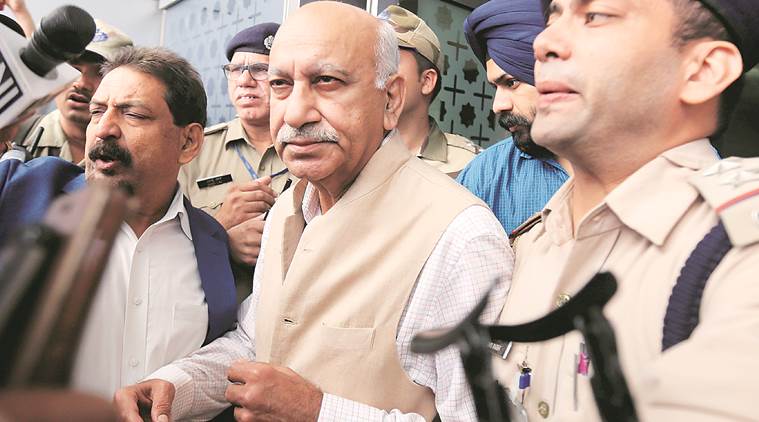 Minister of State for External Affairs M J Akbar arrives at Delhi airport Sunday. (Express photo by Prem Nath Pandey)
Minister of State for External Affairs M J Akbar arrives at Delhi airport Sunday. (Express photo by Prem Nath Pandey)
THE list of those who have quit the Union Council of Ministers is one of heavyweights — starting with the first finance minister
R K Shanmukham Chetty (1949), Syama Prasad Mookerjee (1950), B R Ambedkar (1951), Lal Bahadur Shashtri (1956), V Krishna Menon (1962), Jagjivan Ram (1977), V P Singh (1987), George Fernandes (1979 and 2001), Ram Vilas Paswan (2002), K Natwar Singh (2005) and A Raja (2010) among others. Certainly, junior foreign minister M J Akbar’s resignation Wednesday may seem a small step but it could be a big milestone in India’s evolving politics. Behind the earlier resignations, the key reasons were: Opposition allegations of corruption (Shanmukham Chetty, TT Krishnamachari, K D Malviya, Kalpnath Rai, Fernandes, Natwar Singh, A Raja); ideological grounds (K C Neogi, Syama Prasad Mookerjee, Ambedkar, John Mathai), political calculations (CD Deshmukh, Jagjivan Ram, VP Singh and Ramvilas Paswan) and even the moral high ground (Lal Bahadur Shashtri, Madhav Rao Scindia).
Akbar’s stands out because it is one of its kind: for the first time, a Minister has had to quit because of his alleged insensitivity and violation of a group of women over years.
Though women’s empowerment has always found mention in the political discourse, the sequence of events leading to Akbar’s resignation has the potential to be counted as a major milestone in modern politics.
It has two key elements: a feminist movement (#MeToo) that draws its strength and keeps its focus on the working woman, a step beyond Beti Bachao and Beti Padhao and the current discourse of basic infrastructure for women (food, cooking gas); and a campaign heavily anchored in social media. In fact, these two prompted some critics to call it as elitist and disconnected from India’s realities.
However, these very elements make it broad and expansive with widening opportunities in education along with economic growth and increasing awareness because of the spread of mobile internet.
The latest edition of All India Survey of Higher Education (AISHE-2017-18) estimates total enrolment in higher education at about 36.6 million where girls (17.4 million) constitute 47.6%. Behind this feminist assertion, is the rising participation of women in higher education.
The number of females per hundred males enrolled in higher education in India is steadily rising — from 13 girls per 100 boys (1950-51) to over 85 per 100 in 2014-15. This is only going to swell the ranks of woman in the work place asking for their rights and challenging the male order.
Coupled with this is the diffusion of mobile internet. Industry estimates mobile internet to the tune of little under 500 million in the country. It’s a fact that men have more access to it than women but with the decline in prices of low-end smart phones, their figures are rising rapidly. The reducing wireless data costs is also going to make mobile internet widely accessible.
The #MeToo campaign, organised through mobile internet tools that bypass the established political organisations or advocacy groups and, in some cases, the mainstream media, too, has demonstrated its effectiveness for future campaigns.
“Der aaye, durust aaye,” (better late than never) veteran politician Sharad Yadav told The Indian Express about Akbar’s resignation adding, “it should have been done at the earliest without this delay.”
Yadav’s remarks assume significance given that he once faced the ire of women for his “parkati” (bob-cut hair) remark for women.
“I did not intend to offend women,” he said when reminded today. “My remark was made in reference to the women’s reservation issue where I was arguing the case for representation of women from backward castes in the women quota. I was just voicing apprehensions that women from the upper class will corner the women’s quota. But I did express regret for usage of parkati word to voice my apprehensions.”